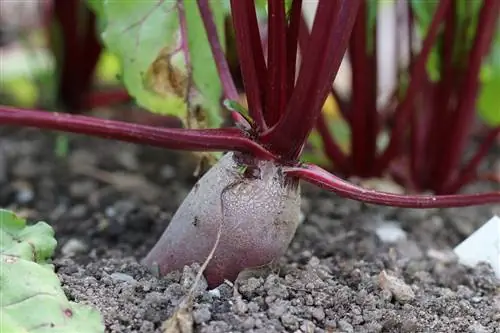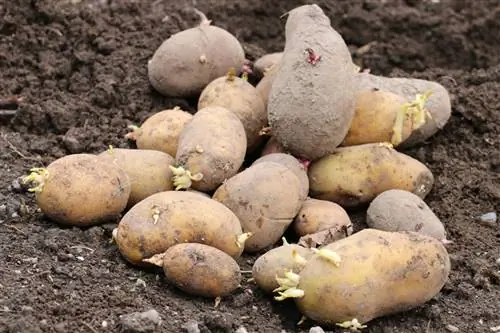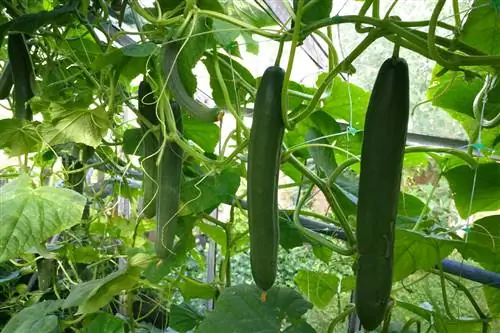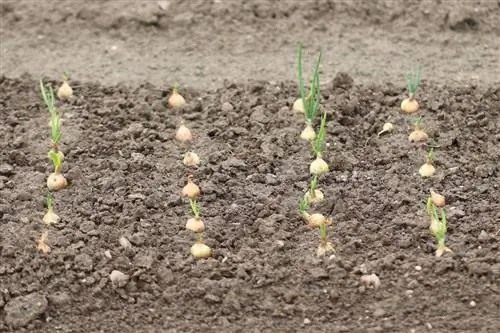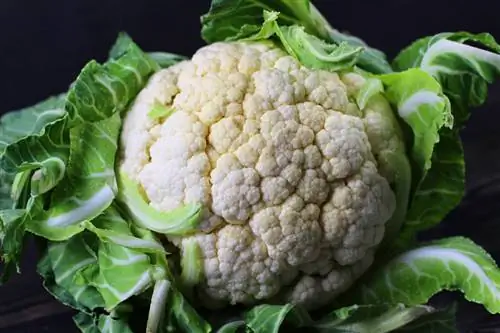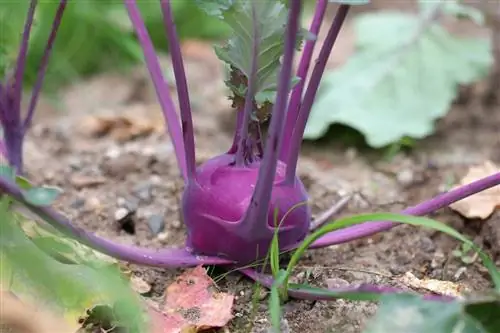- Author admin caroline@plants-knowledge.com.
- Public 2023-12-17 03:39.
- Last modified 2025-01-24 12:45.
Good neighbors support your beetroot in a variety of ways, for example to provide shade or to improve the soil. There are 17 different species available to you as good neighbors.
Vegetables: 8 plant neighbors
Cucumber (Cucumis sativus)
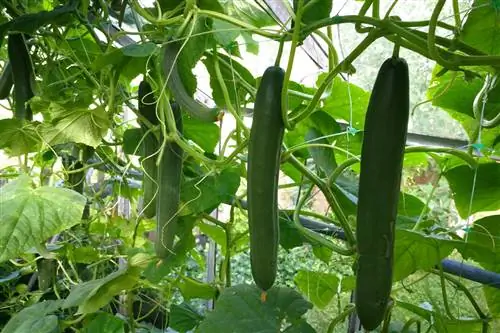
- Effects: does not compete for sun, optimizes soil moisture
- Growth height: up to 400 cm (depending on climbing aid)
- Space requirement: 30 cm to 40 cm
- Light requirement: full sun
- Location and soil: sheltered from the wind, loose, humic, permeable, nutrient-rich
- Harvest time: May to October (depending on the time of sowing and location)
- Heavy eaters
Vegetable cabbage (Brassica oleracea cultivars)
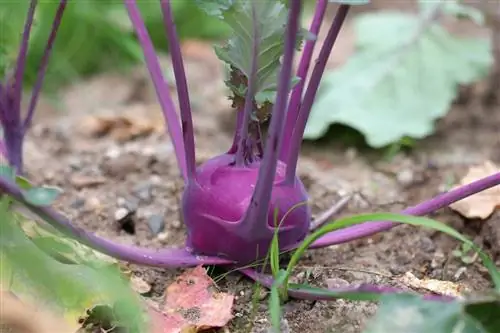
- this includes kohlrabi, white cabbage, broccoli or Brussels sprouts
- Effects: improves the soil structure, has a positive effect on growth
- Growth height: 50 cm to 120 cm (depending on cultivation form)
- Space requirement: 50 cm to 60 cm
- Light requirements: sunny to partially shaded
- Location and soil: highly dependent on cultivation form
- Harvest time: highly dependent on the cultivation form and time of sowing
- Heavy eaters or moderate eaters
Garlic (Allium sativum)
- Effects: protects against pests
- Growth height: 25 cm to 90 cm
- Space requirement: 15 cm
- Light requirement: sunny
- Location and soil: warm, loose, permeable, humus
- Harvest time: very variable, recognizable by withered leaves or visible garlic cloves
- Middle eaters
Parsnip (Pastinaca sativa)
- Effects: improves soil structure, optimizes soil moisture
- Growth height: 25 cm to 120 cm
- Space requirement: 15 cm
- Light requirements: full sun to partial shade
- Location and soil: loose, deep, loamy, humus, moist
- Harvest time: September to October
- Middle eaters
Radish (Raphanus)
- Effects: protects against pests
- Growth height: depending on species
- Space requirement: 5 cm to 25 cm (depending on type)
- Light requirements: full sun to partial shade
- Location and soil: humus, loamy, sandy,
- Harvest time: June (summer radish), October to December (winter radish)
- Middle eaters
Pick lettuce (Lactuca sativa var. crispa)
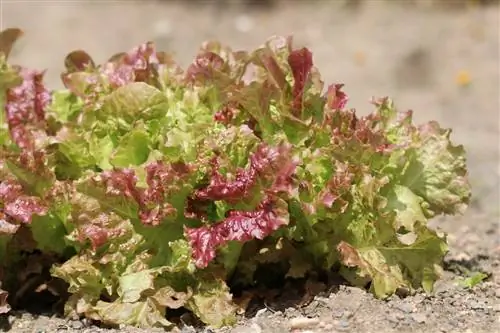
- Effects: does not compete for space, improves aroma
- Growth height: up to 30 cm
- Space requirement: 20 cm
- Light requirements: sunny to partially shaded
- Location and soil: nutrient-rich, humus
- Harvest time: until the end of October, 4 to 5 weeks after sowing
- Middle eaters
Zucchini (Cucurbita pepo subsp. pepo convar. giromontiina)
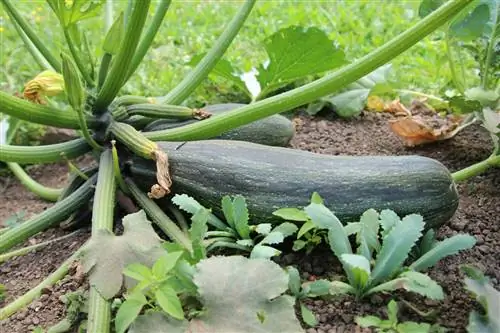
- Effects: protects soil from drying out
- Growth height: 45 cm
- Space required: 100 cm
- Light requirements: sunny to partially shaded
- Location and soil: loose, nutrient-rich, humus, protected from frost
- Harvest time: from mid-June (depending on the time of sowing), fruits should be 15 cm to 20 cm long
- Heavy eaters
Onion (Allium cepa)
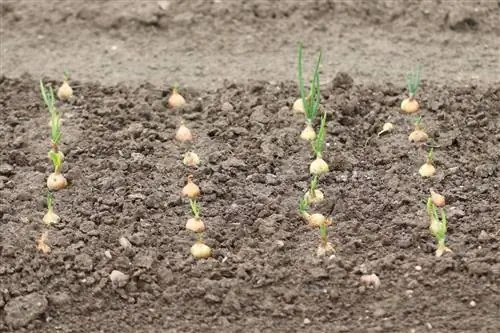
- Effects: repels pests
- Growth height: up to 120 cm
- Space required: 10 cm
- Light requirement: full sun
- Location and soil: warm, moist, loose, humic, loamy
- Harvest time: end of August to mid-September, onion greens must be dried out
- Middle eaters
Note:
The beetroot's bad neighbors include other foxtail plants such as chard and spinach. Furthermore, you should avoid a mixed crop with runner beans, potatoes, leeks, tomatoes and corn.
6 good herbal neighbors
Savory (Satureja)
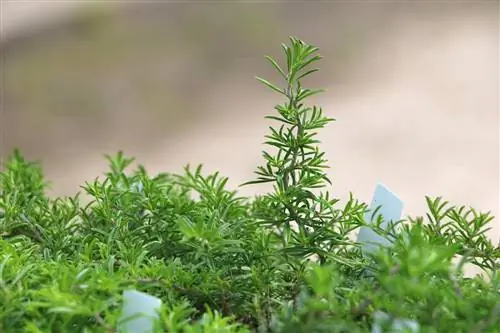
- Effects: protects against pests, especially plant lice
- Growth height: 25 cm to 40 cm
- Space requirement: 25 cm
- Light requirement: sunny
- Location and soil: warm, sheltered from the wind, lean, light, rich in limestone
- Harvest time: June to October (during flowering)
- Weak eater
Dill (Anethum graveolens)
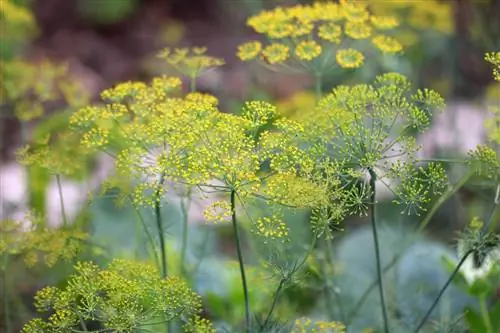
- Effects: promotes growth, has a positive effect on the taste of the beetroot
- Growth height: 30 cm to 120 cm
- Space requirement: 25 cm to 30 cm
- Light requirements: sunny to partially shaded
- Location and soil: sheltered from the wind, poor, moist, moderately difficult
- Harvest time: mid-May to mid-October
- Weak eater
Garden cress (Lepidium sativum)
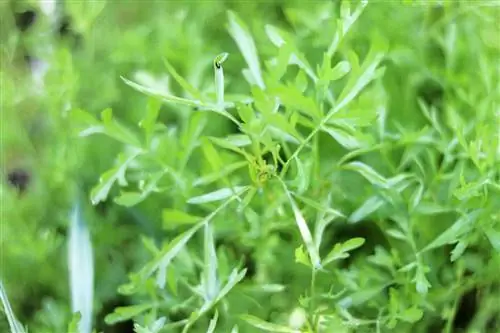
- Effects: enriches soil with nutrients
- Growth height: up to 40 cm
- Space requirement: 15 cm
- Light requirements: sunny to shady
- Location and soil: humus, loose, moist
- Harvest time: 2 to 3 weeks after sowing over the entire season
- Weak eater
Catnip (Nepeta cataria)
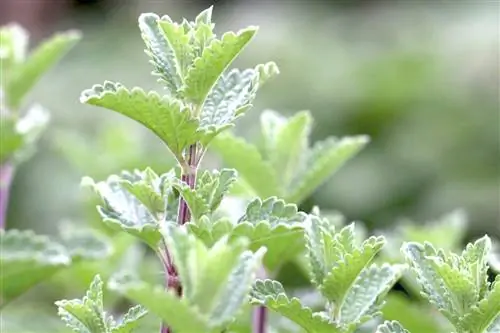
- Effects: protects against pests
- Growth height: 20 cm to 100 cm
- Space required: 30 cm
- Light requirement: sunny
- Location and soil: fresh, moderately nutrient-rich, well-drained, dry
- Harvest time of leaves and flowers: June to the end of July
- Middle eaters
Coriander (Coriandrum sativum)
- Effects: attracts beneficial insects, protects against pests
- Growth height: 25 cm to 100 cm
- Space required: 30 cm
- Light requirement: sunny
- Location and soil: protected, warm, loose, permeable, enriched with lime
- Harvest time: 4 to 6 weeks after sowing across the season
- Weak eater
Caraway (Carum carvi)
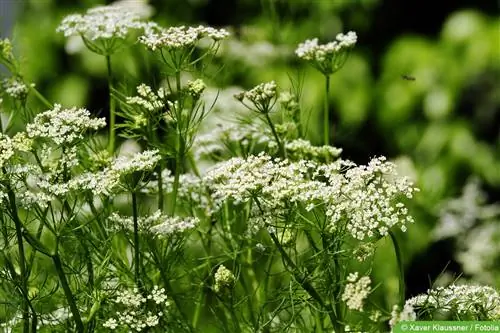
- Effects: has a positive effect on the aroma
- Growth height: 30 to 120 cm
- Space requirement: 15 cm
- Light requirements: sunny to partially shaded
- Location and soil: deep, nutrient-rich, moist
- Harvest time: July (2nd season)
Flowers: 3 good neighbors
Nasturtium (Tropaeolum)
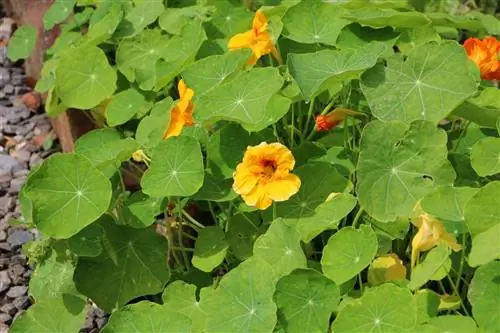
- Effects: protects against pests
- Growth height: 20 cm to 300 cm (depending on tendril length)
- Space requirement: depending on tendril length
- Light requirements: sunny, shade is tolerated
- Location and soil:
- edible plant parts: seeds, leaves, flowers
- Weak eater
Marigolds (Calendula officinalis)

- Effects: promotes growth, has a positive effect on taste
- Growth height: 30 cm to 80 cm
- Space requirement: 15 cm to 20 cm
- Light requirements: sunny to partially shaded
- Location and soil: sandy, loose, nutrient-rich, enriched with lime, moist
- Harvest time: June to October (flowers), entire season (leaves as leafy vegetables
- Weak eater
Sunflowers (Helianthus annuus)
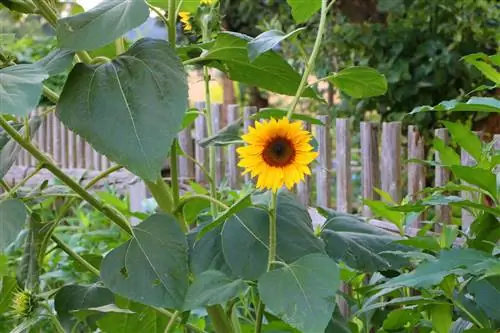
- Effects: protects against pests, provides shade
- Growth height: up to 300 cm
- Space requirement: 50 cm to 60 cm
- Light requirement: full sun
- Location and soil:
- Harvest time: 7 days after flowers wilt in September
- Heavy eaters
Tip:
If you have space in the bed, you could also plant chamomiles (Matricaria chamomilla) as neighbors. They protect against fungal diseases because they make the beetroot more resilient.

